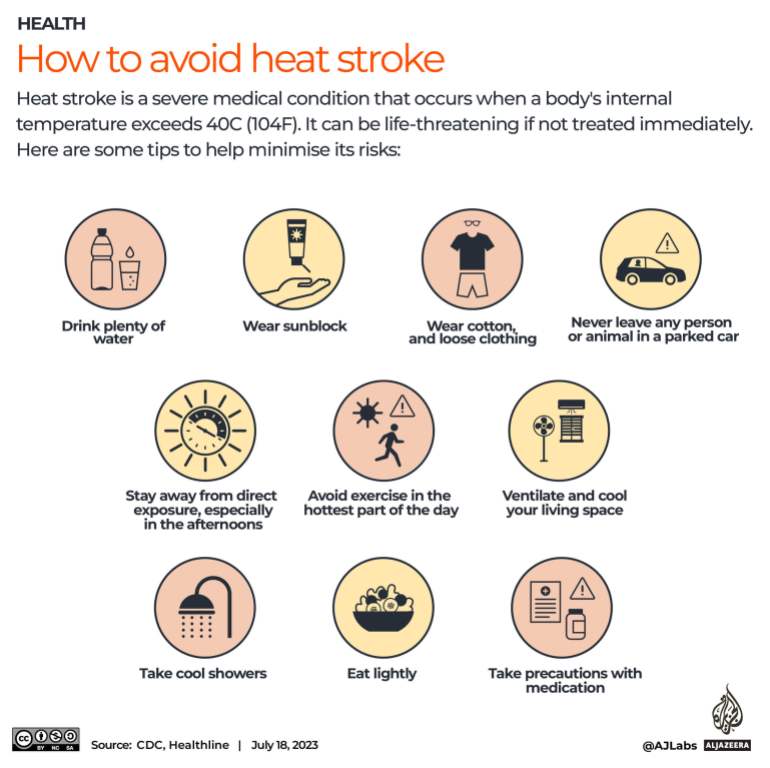Government workplaces, banks, capital markets and personal companies will likely be closed till Saturday.
The sudden nationwide vacation till Thursday was introduced by the federal government on Tuesday, citing a request from the Ministry of Health, which stated the request was as a result of growing variety of folks requiring therapy for warmth stroke.
But whereas temperatures are rising as a result of sweltering summer time warmth, they don’t seem to be as “unprecedented” as the federal government warns.

In addition to authorities workplaces, banks, and capital markets, non-public companies had been additionally ordered to shut.
Most companies within the capital Tehran appeared to have complied Wednesday, though some selected to maintain their shutters open.
“We are open right now and another outlets are additionally open, however I believe they’ll most likely shut sooner than common,” stated Rouzbeh Amani, a 33-year-old employee at Tehran’s Grand Bazaar.
“There weren’t that many shoppers right now, and most of them had been from outdoors Tehran,” he advised Al Jazeera.
“They say the climate is good.”
The common excessive temperature in Tehran in August is round 36 levels Celsius (97 levels Fahrenheit), with a excessive of 42 levels Celsius (108 levels Fahrenheit).
Temperatures at noon on Wednesday had been round 37°C (99°F), with highs anticipated to rise to 40°C (104°F) on Thursday.
Temperatures reached round 33 levels Celsius (91 levels Celsius) in lots of the cooler northern states close to the water, whereas some scorching southern states neared 45 levels Celsius (113 levels Celsius).
Kian, a journalist based mostly in Cistern and Baluchestan, stated temperatures of 40 levels Celsius within the southeast had been manageable in comparison with temperatures within the southeast that exceeded 50 levels Celsius (122 levels Celsius) final month. Told.

“The Cistern was not closed.” [then]”Despite dealing with a multifaceted disaster corresponding to mud and pollution, excessive temperatures, strained water provides and energy outages,” he advised Al Jazeera. “I do not perceive why it is closed now. Even the folks of the state do not perceive why. They say the climate is best than it was again then.”
With temperatures comparatively near the traditional summer time vary in some areas, the nationwide shutdown has led to hypothesis on-line that the federal government is dealing with difficulties in producing hydroelectric energy, its fundamental supply of electrical energy. There is widespread hypothesis that this can be the case.
Hamed, a 44-year-old engineer and businessman who works within the copper trade, believes the foundation of the issue is Iran’s extreme water scarcity, which is deadly for a rustic that depends totally on hydropower. Told.
“We have lengthy confronted severe mismanagement of water consumption, particularly in trade,” stated Hamed, who didn’t need to give his full identify. “I consider these closures are positively as a result of energy shortages as a result of water shortages.”
However, the federal government and state media denied any hyperlink between the shutdown and electrical energy consumption, saying the Energy Ministry had no drawback producing sufficient electrical energy.

But the ministry has been sounding the alarm in current weeks about rising electrical energy consumption, saying in late July that home electrical energy utilization hit a brand new file of about 72,000 megawatts per day.
Iran is used to energy outages in the midst of summer time, however there have been fewer energy outages this yr.
Hamed stated this mirrored a change within the authorities’s method underneath President Ebrahim Raisi, who confronted heavy criticism of his predecessor Hassan Rouhani over repeated energy outages final yr. He additionally stated he would have needed to take care of social unrest in Iran, together with nationwide protests.
“The authorities has shifted the burden of energy outages from family consumption to trade. Industrial parks, even these on the outskirts of Tehran, face pure fuel provide outages within the winter and are actually power-consuming. The amount is restricted,” stated an engineer who has labored in industrial parks round Tehran, Kerman and Tabriz.


